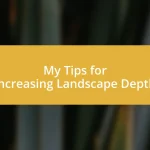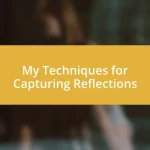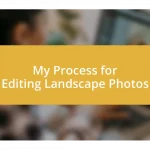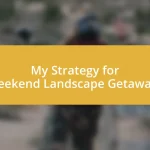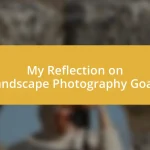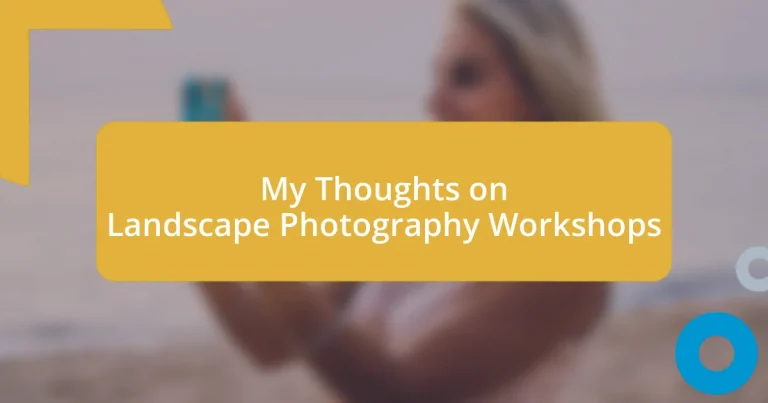Key takeaways:
- Landscape photography workshops provide hands-on learning experiences, fostering technical skill development and personalized feedback from experienced instructors.
- Choosing the right workshop involves assessing instructor expertise, workshop size, location, and goals to ensure it aligns with your interests.
- Post-workshop reflections and networking opportunities enhance ongoing learning and creativity, allowing participants to continue growing as photographers.
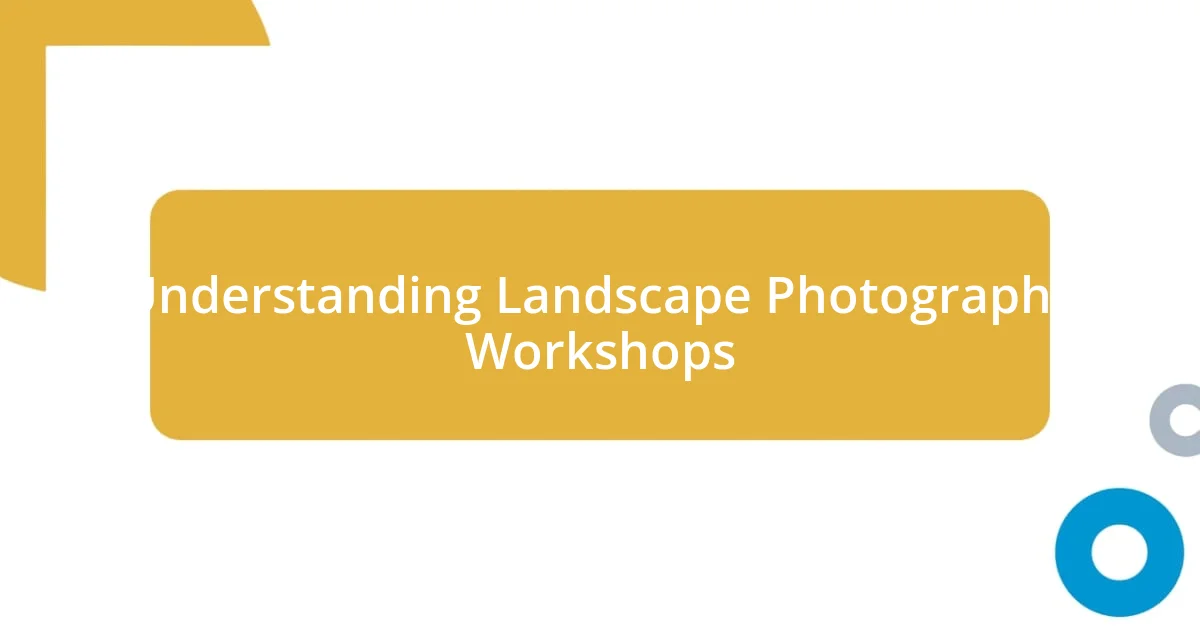
Understanding Landscape Photography Workshops
When I first stumbled into landscape photography workshops, I wasn’t sure what to expect. The initial thought of being surrounded by experienced photographers made me a bit anxious, but it turned out to be a welcoming experience. Have you ever felt that mix of excitement and nervousness when entering a new space? I found that workshops are fantastic for breaking through those fears, as everyone is there to learn and share.
One thing I really enjoyed was the hands-on approach these workshops offer. Being out in the field with a group, guided by a knowledgeable instructor, is where the magic happens. I remember learning about the importance of light and composition while hiking to a stunning vista. There’s something special about discovering techniques and then immediately putting them into practice. Do you grasp how much you can grow when you see concepts come alive right before your eyes?
It’s also worth mentioning the camaraderie that builds among participants. I’ve made lasting friendships during these experiences, as we shared challenges and triumphs while capturing breathtaking scenes. Each person’s unique perspective and creativity opened my eyes to new possibilities. Have you ever left a workshop feeling not just inspired, but connected to a community? That sense of belonging truly enhances the learning process.
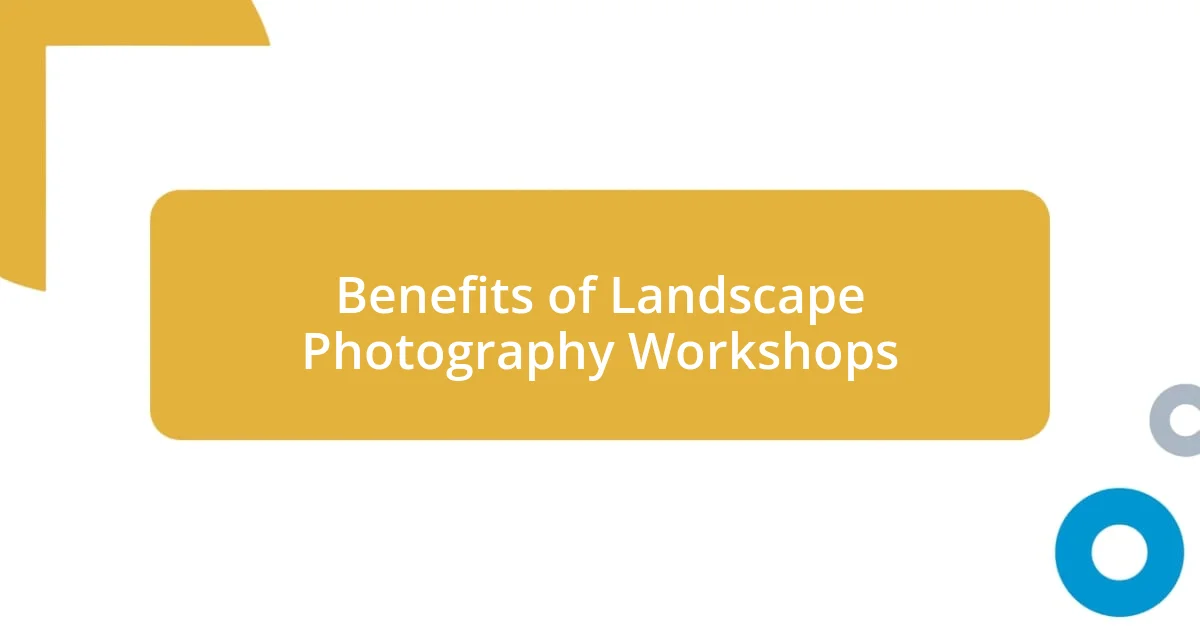
Benefits of Landscape Photography Workshops
Participating in landscape photography workshops greatly enhances one’s technical skills. I vividly recall a session where we focused on long exposure techniques. Watching water transform into silky smoothness through the lens felt like a revelation! These guided experiences accelerate your learning curve because you’re not just reading about these techniques; you’re applying them right away. Isn’t it fascinating how hands-on experience solidifies what you learn?
One of the standout benefits of workshops is personalized feedback from experts. During my first workshop, the instructor critiqued my approach to framing a shot, which led to an “aha!” moment. They encouraged me to step back, evaluate the scene, and capture not just the subject, but the entire atmosphere. This kind of mentorship is invaluable because it gives you tailored insights that online tutorials simply can’t replicate. Don’t you think having direct guidance can make all the difference in your growth as a photographer?
Moreover, the opportunity to explore new locations is another delightful perk. On my last workshop in the mountains, I discovered hidden gems I never would have found on my own. Each location was selected for its unique lighting and composition challenges, making every moment feel like an adventure. Being inspired by different landscapes cultivates a fresh mindset. Isn’t that the goal—to expand your creativity and perspective?
| Benefit | Description |
|---|---|
| Technical Skill Development | Hands-on learning experiences that enhance practical photography skills. |
| Personalized Feedback | Direct insights from experienced instructors lead to tailored growth. |
| Exploration of New Locations | Access to diverse landscapes that spark creativity and inspiration. |
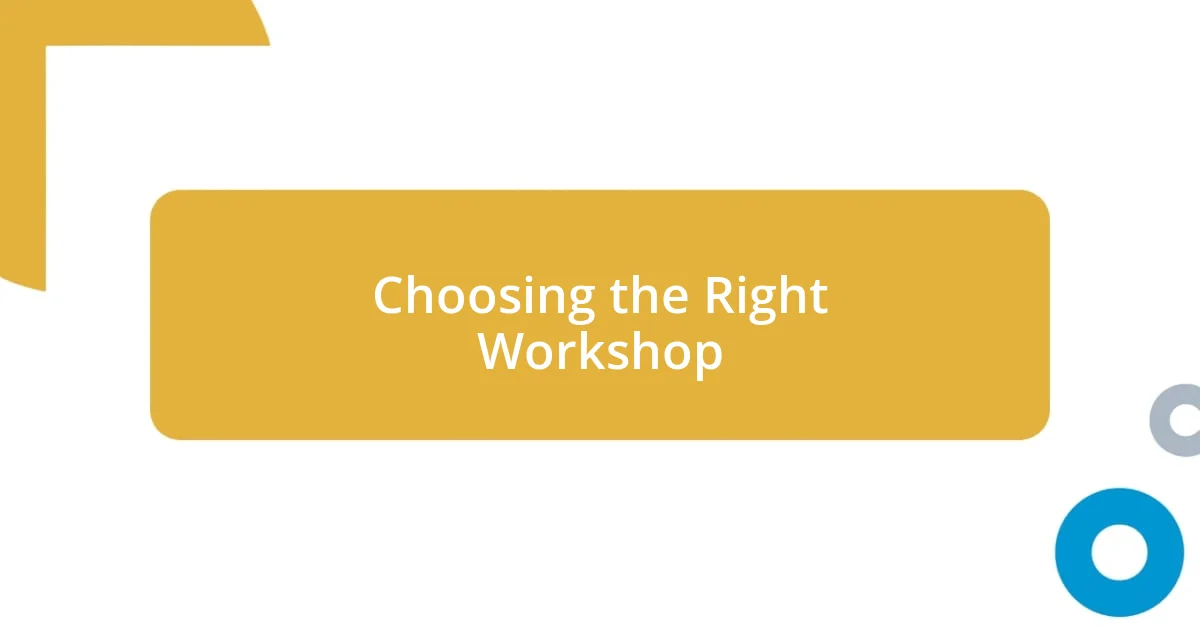
Choosing the Right Workshop
Choosing the right landscape photography workshop can feel overwhelming, but I believe it’s crucial to align your goals with what the workshop offers. I remember my excitement mixed with apprehension when I chose my first workshop—I didn’t want to invest time and money without getting the most out of it. Before selecting one, I recommend looking into different aspects like the instructor’s expertise, location, and the schedule to ensure it meets your specific needs.
Here are some key points to consider:
- Instructor Experience: Prioritize workshops led by established photographers whose work resonates with you.
- Workshop Size: Smaller groups often mean more personalized attention and feedback.
- Location: Think about whether you want to capture coastal scenes, mountains, or urban landscapes. Focus on what inspires you most.
- Goals and Focus: Some workshops emphasize technical skills, while others might focus on creativity or specific themes, so choose based on your aims.
- Participant Reviews: Seek feedback from previous attendees to gauge their experiences, which can offer invaluable insights about the workshop’s effectiveness.
In my experience, aligning your personal interests with a workshop can significantly enrich your learning journey. I once chose a workshop fixated on night sky photography because I was eager to explore astrophotography. The thrill of capturing the Milky Way alongside fellow enthusiasts, under the guidance of an expert, was absolutely worth it. Those shared moments—and a deep sense of achievement when we compared our shots—made it unforgettable. It’s a reminder that the right workshop doesn’t just teach you skills; it connects you with like-minded individuals who share your passion. What could be better than that?
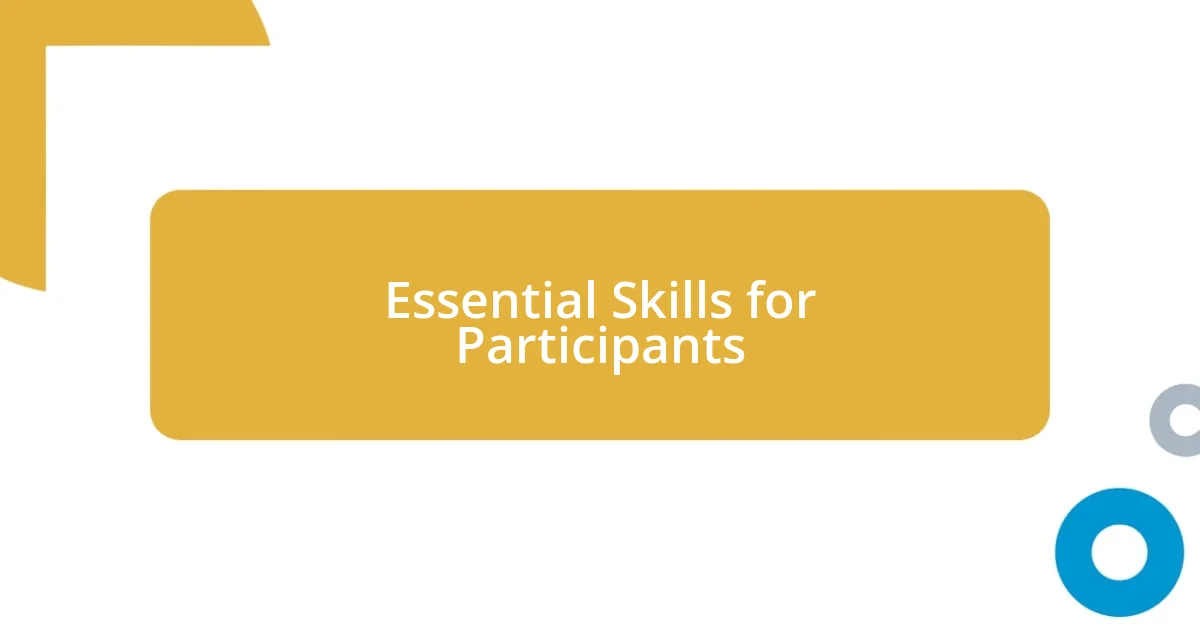
Essential Skills for Participants
When participating in landscape photography workshops, having a solid grasp of basic photography principles is essential. I remember feeling a bit lost during my first session because I hadn’t fully understood concepts like aperture and shutter speed. It’s amazing how knowing these fundamentals can unlock the creative potential in your shots. If you’re clear about how these settings affect exposure, you’ll capture landscapes that truly resonate.
In addition to technical knowledge, adaptability is a skill I consider vital for workshop participants. I once found myself in unpredictable weather during a session. While others hesitated, I embraced the moody clouds and captured some of my favorite images. Flexibility allows you to make the most out of every situation, whether it’s working with changing light or adjusting your composition on the fly. How do we grow as photographers if we don’t learn to embrace the unexpected?
Lastly, I believe that a keen sense of observation is crucial. During one workshop, I distinctly remember the instructor encouraging us to notice the small details in our surroundings—like the way light danced on leaves or how shadows contoured a rocky surface. This heightened awareness transformed how I approached each landscape. Have you ever caught yourself missing the magic in the mundane? Cultivating that skill can elevate your photography from average to extraordinary.
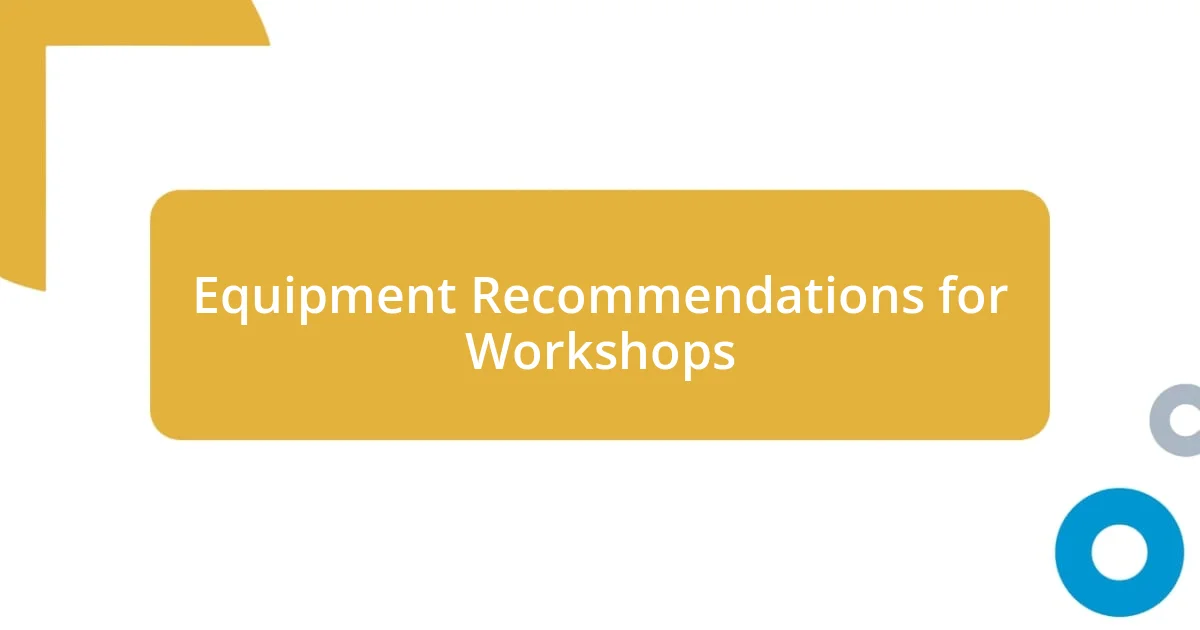
Equipment Recommendations for Workshops
When it comes to selecting equipment for landscape photography workshops, I can’t stress enough the importance of a reliable camera and lens. During my first workshop, I lugged around heavy gear that made me exhausted by midday! Now, I prefer a lightweight mirrorless camera paired with a versatile zoom lens. This combo allows for flexibility while hiking and quickly adapting to various shooting scenarios. Have you ever felt limited by your gear? Trust me, investing in the right equipment can significantly enhance your experience.
Filters are another essential aspect that I believe shouldn’t be overlooked. I vividly remember a workshop where my polarizing filter helped cut glare while capturing reflections on a tranquil lake. The colors popped, and the images resonated with a depth that I didn’t achieve without it. If you want to bring out the best in your landscapes, consider investing in a good set of filters. They can be game-changers when the light isn’t perfect.
Tripods, too, play a pivotal role in landscape photography. I learned this the hard way during one session amidst breathtaking sunset colors—my hands shook slightly from excitement, resulting in blurred images. Now, I always grab a sturdy tripod before heading out. It’s essential for those longer exposures, especially during golden hour or night shots. Have you ever struggled to keep your camera steady? A good tripod not only offers stability but also allows you to explore creative angles without fear of camera shake.
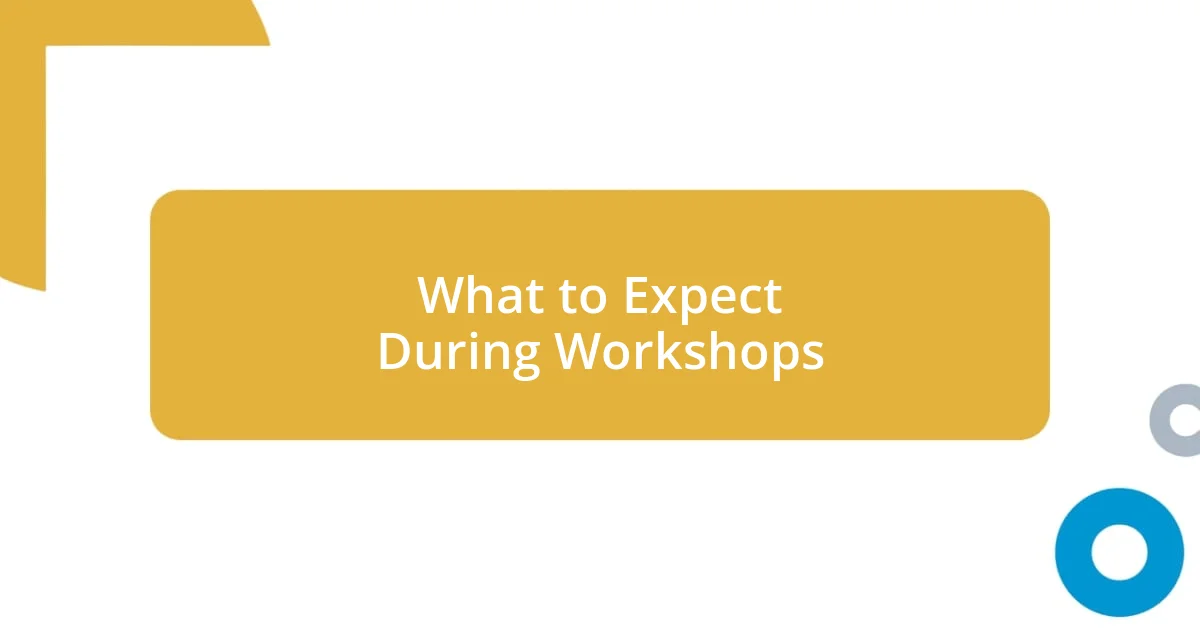
What to Expect During Workshops
During workshops, participants can expect a blend of hands-on practice and insightful discussions. I fondly recall my first workshop, where the instructor emphasized the power of composition while we stood overlooking a breathtaking vista. As we practiced framing shots, I felt a sense of camaraderie among fellow participants, all eager to learn and share our attempts. That shared experience is what makes workshops so special; it’s not just about clicking the shutter, but also learning from and inspiring one another. Isn’t it inspiring to be surrounded by people with a similar passion?
You’ll also find that feedback sessions are a crucial component of workshops. I remember nervously sharing my work for critique during one session, unsure of how my peers would respond. But the constructive feedback I received was invaluable, helping me see my images from different perspectives. Engaging in discussions about each other’s work fosters growth and confidence. Have you ever felt afraid to show your work? It’s really in those moments of sharing that we often discover our greatest potential.
Another aspect to anticipate is unexpected encounters with nature. I once found myself knee-deep in a marsh during a workshop when a sudden herd of deer emerged from the trees. That spontaneous moment added a layer of excitement to our day. Embracing the unpredictability of the natural environment not only challenges your skills but also enriches the overall experience. How often do you find magic in unplanned moments? This is truly what landscape photography, and workshops, are all about—capturing fleeting beauty when you least expect it.
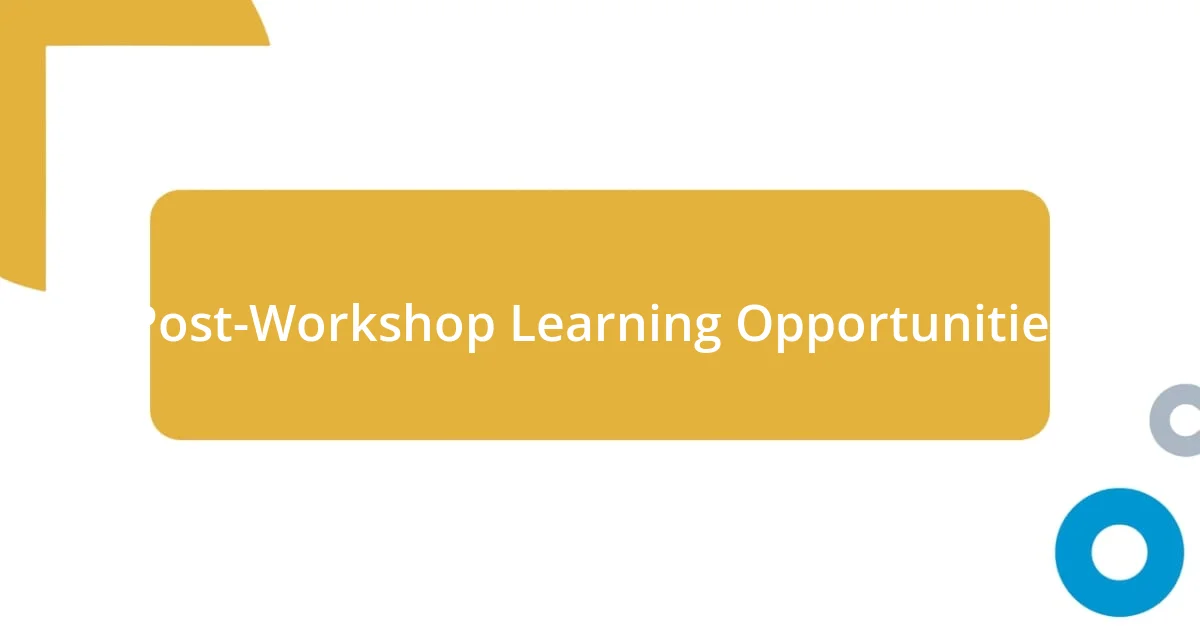
Post-Workshop Learning Opportunities
After a landscape photography workshop, the journey doesn’t just stop. I often find that the real learning begins when I sit down with my photos and reflect on the techniques I was exposed to. I remember one time after a workshop on night photography, I spent hours at home reviewing my shots, experimenting with different editing styles. It’s incredible how post-workshop reflection can unlock new perspectives on your own work.
Networking with fellow participants and instructors after the workshop also presents a golden opportunity for growth. I’ve exchanged countless emails with fellow photographers, picking their brains and sharing tips well past the workshop’s end. Can you recall a time when a simple conversation sparked a new idea or approach in your work? These connections can lead to collaborations and even friendships that enrich your photographic journey long after the workshop is over.
In addition, many workshops provide access to online communities or platforms where participants can continue to share their work and receive feedback. I still engage in a group chat from one of my earlier workshops, and it’s a wonderful space where we regularly critique each other’s photos and share resources. It’s amazing how much further I’ve come with that ongoing support. Have you considered how a community can lift your artistry? Embracing these post-workshop opportunities can truly set you on a path of continuous improvement and creative exploration.

